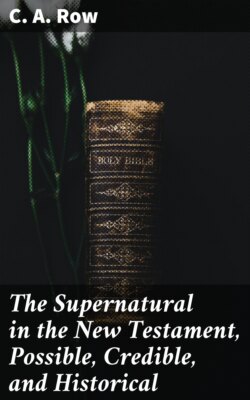Читать книгу The Supernatural in the New Testament, Possible, Credible, and Historical - C. A. Row - Страница 4
На сайте Литреса книга снята с продажи.
Dedication.
ОглавлениеTable of Contents
To The Committee Of The Christian Evidence Society.
My Lords and Gentlemen,
Having undertaken to compose this work at your request, I beg permission to dedicate it to you. In doing so I feel that it is a duty which I owe both to you and to myself that I should state the position which we respectively occupy with regard to it. Your responsibility is confined to having requested me to compose a work in refutation of certain principles now widely disseminated, which impugn the supernatural elements contained in the New Testament. For the contents of the work and for the mode of treatment I alone am responsible. When I considered the position of the present controversy, I felt that it was impossible to treat the subject satisfactorily except on the principle that the responsibility for the mode of conducting the argument and of answering the objections should rest with the writer alone. In dealing with a subject so complicated, involving as it does questions of philosophy and science as well as the principles of historical criticism, I can scarcely venture to hope that every position which I have taken will prove acceptable to [pg iv] all the various shades of theological thought. I have endeavoured to take such as seemed to me to be logically defensible without any reference to particular schools of theological opinion. As the entire question is essentially historical, I have done my utmost to exclude from it all discussions that are strictly theological. Modern unbelief however puts in two objections which if valid render all historical evidence in proof of the occurrence of miracles nugatory, namely that they are both impossible and incredible. In meeting these I have been compelled to appeal to what appear to me to be the principles of a sound philosophy. In all other respects I have viewed the question before me as exclusively one of historical evidence.
If the Resurrection of our Lord is an actual occurrence, it follows that Christianity must be a divine revelation. If it is not, no amount of other evidence will avail to prove it to be so. As it has been strongly affirmed that for this great fact, which constitutes the central position of Christianity, the historical evidence is worthless, I have devoted the latter portion of this volume to the consideration of this question, with a view of putting before the reader the value of the New Testament when contemplated as simple history. Using the Epistles as the foundation of my argument, I have endeavoured to prove that the greatest of all the miracles recorded in the Gospels rests on an attestation that is unsurpassed by any event recorded in history. For this purpose I have used the Epistles as simple historical documents, and I have claimed for them precisely the same value which is conceded to other writings of a similar description. The feeling [pg v] among Christians that these writings contain the great principles of the Christian faith has occasioned it to be overlooked that they are also contemporary historical documents of the highest order. As such I have used them in proof of the great facts of Christianity, above all in proof of the greatest of them, the Resurrection of our Lord.
With these observations I now present you the following work, with the hope that it may prove the means of removing many of the difficulties with which recent controversial writers have endeavoured to obscure the subject. Trusting that it maybe accepted by the great Head of the Church, the reality of whose life and teaching as they are recorded in the Gospels it is designed to establish,
I remain, my Lords and Gentlemen,
Your's faithfully,
C. A. Row.
London, January, 1875.
[pg 001]
